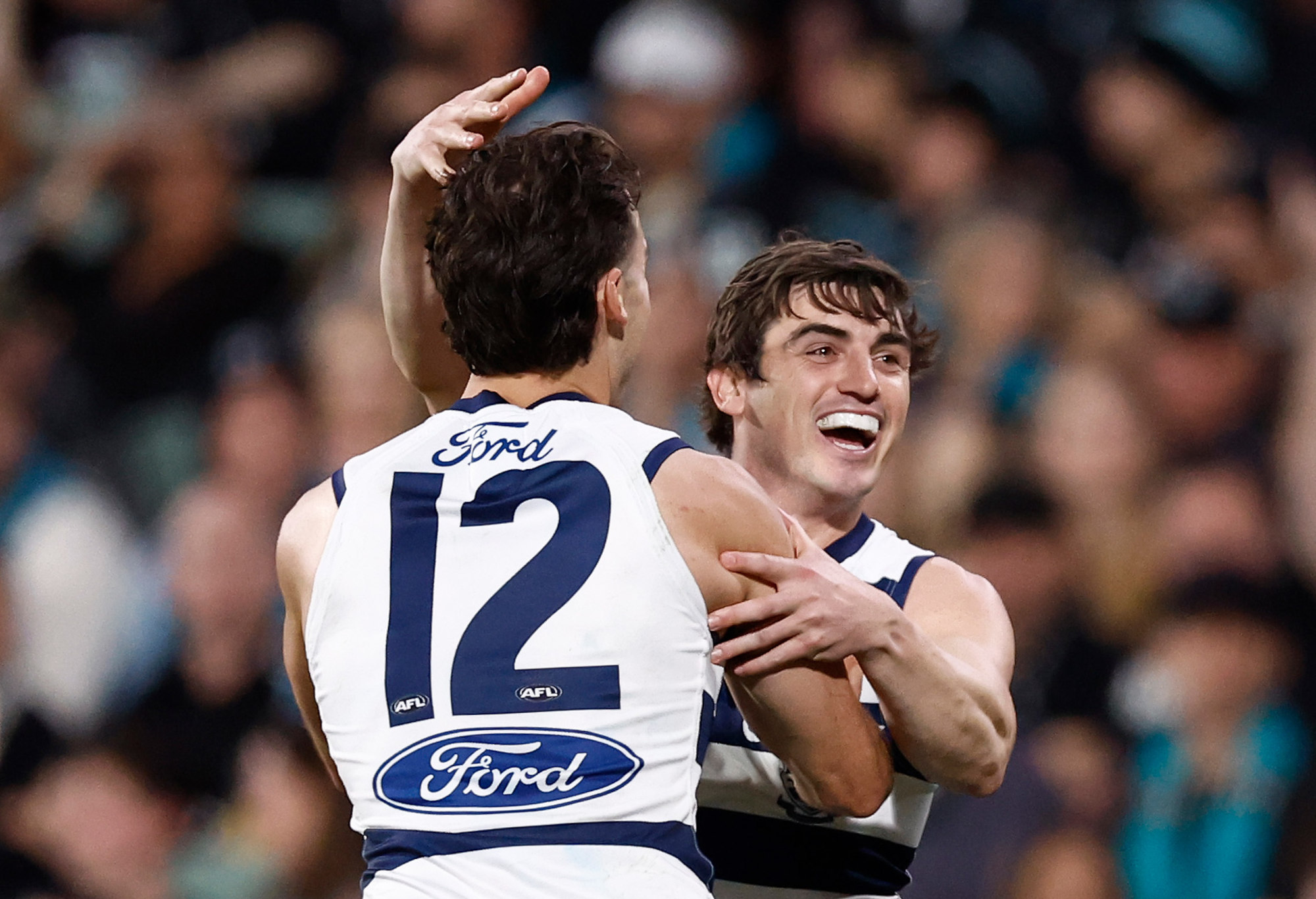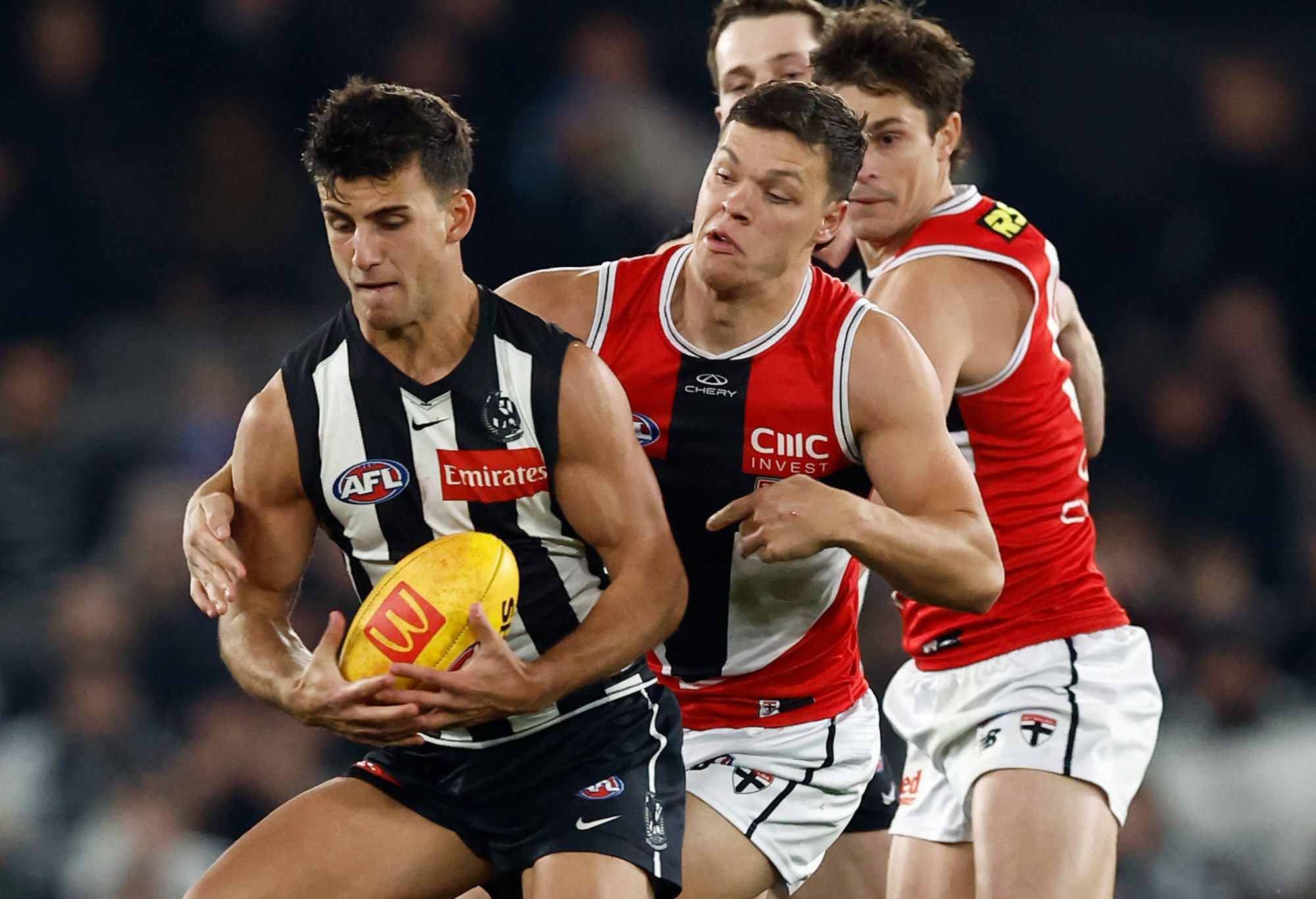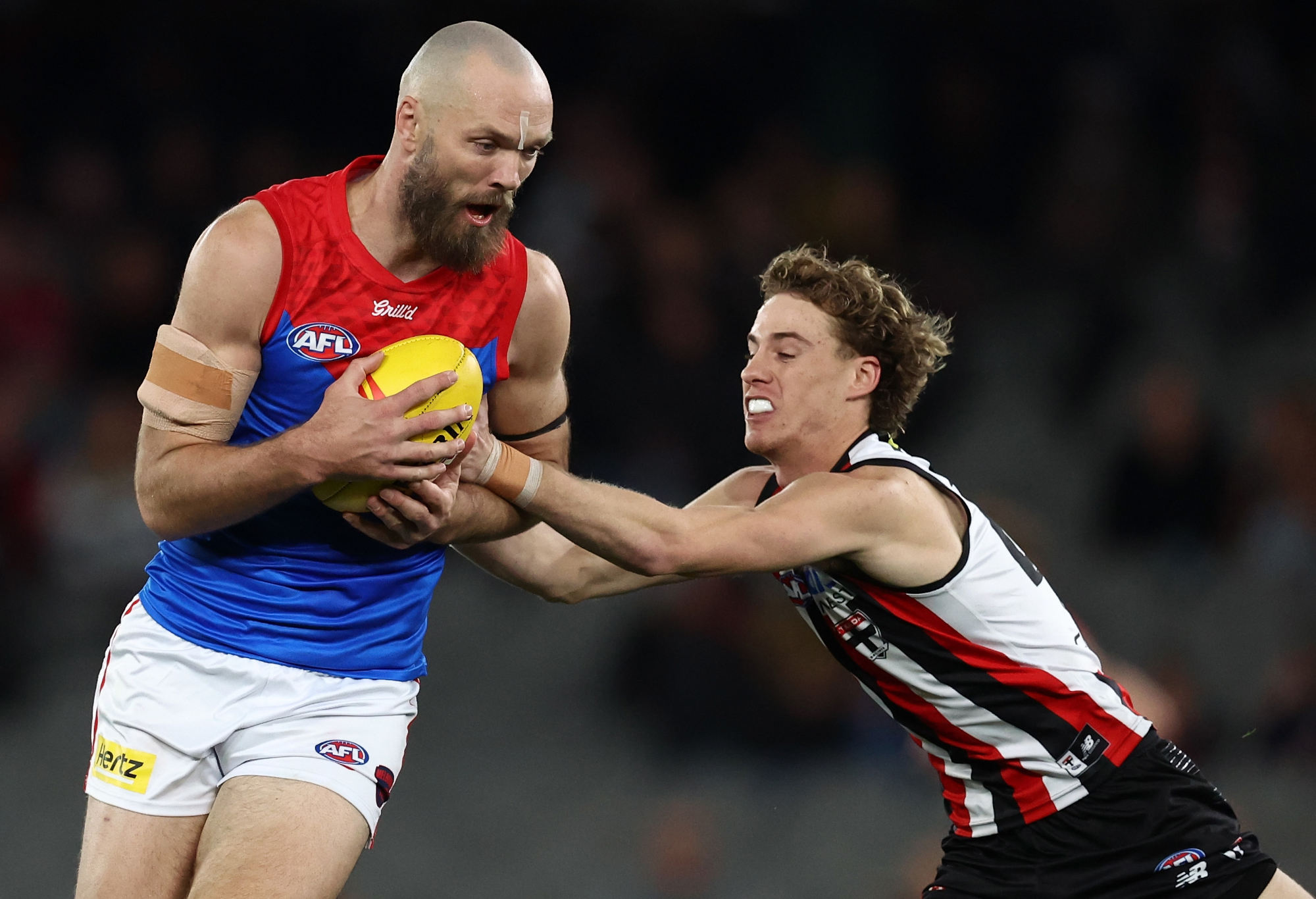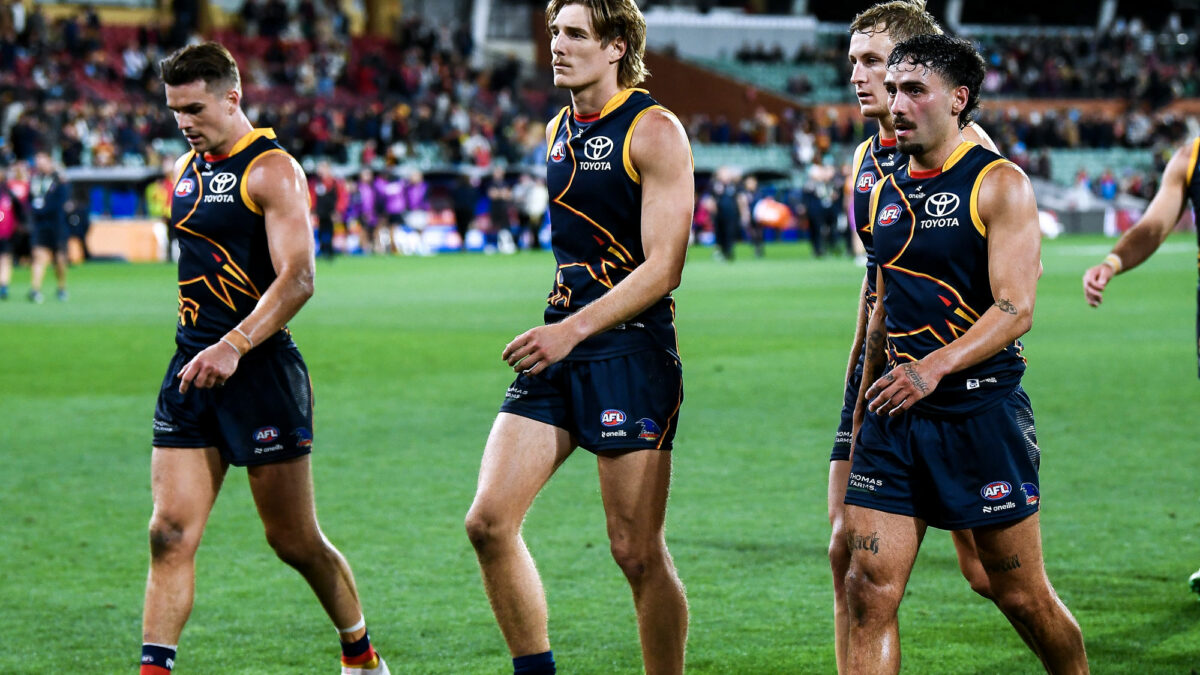The 2025 All-Australian team has been named – and like most years, it has swiftly proved controversial.
Yet more midfielders squeezed into every nook and cranny at the exception of specialists. The miserliest backline in the game getting its two biggest stars snubbed. And perhaps most of all, a captain who doesn’t lead his AFL team getting named as a ‘legacy’ appointment ahead of five AFL skippers alongside him in the team.
It was certainly an interesting evening – and one that was bound to spark debate aplenty from the moment 28-year old Shaun Mannagh was named the AFL Coaches Association’s ‘Best Young Player’ for the season.
Here are the winners and losers from the 2025 All-Australian team and AFL Awards Night.
Winners
Hugh McCluggage (eventually)
They say good things come to those who wait – and few have done more waiting than McCluggage.
Named to the extended All-Australian squad but missing out on the team in four consecutive seasons from 2019-2022, and unlucky to not reach that far in 2023 and 2024, the Brisbane midfield maestro seemed destined to end his career alongside the likes of Tom Liberatore, Mal Michael and Luke Shuey as one of the greatest players to never make the team of the year.
But in 2025, McCluggage took matters into his own hands, and somehow managed to get even better. Posting career-high disposal, inside 50 and contested possession numbers while playing a permanent on-ball role, the 27-year old surged past two-time Brownlow Medallist Lachie Neale to become, in the eyes of many, the Lions’ premier midfielder.
The one irony? Having spent years being snubbed as a wingman, McCluggage’s first All-Australian selection, having become a full time on-baller, is … on the wing.
Golden oldies
From Steele Sidebottom claiming the Anzac Medal, to Dayne Zorko dominating again across half-back, to Max Gawn remaining the premier ruckman in the game, to Collingwood breaking the record for oldest ever AFL team on seemingly a weekly basis, 2025 might be the best year for veterans we’ve ever seen.
At 37 years old, the league’s most senior citizen, Scott Pendlebury, is barrelling towards the league’s games record, while Taylor Walker remains a key figure in Adelaide’s minor premiership-winning outfit, and even Jake Melksham put together arguably a career-best year in attack for Melbourne.
Sure, only three players on the ‘wrong’ side of 30 made it to the All-Australian team, but a stack of major awards for the evening were claimed by these elder statesmen – Jeremy Cameron’s Coleman Medal and team captaincy, for one, or Gawn’s record-equalling eighth blazer, for another.
But no one has encapsulated the rise of the veteran in 2025 more than Jack Gunston. Two years on from seemingly winding his career down on the fringes at Brisbane, just a few months shy of his 34th birthday, the triple-premiership Hawthorn hero didn’t just return to stardom – he somehow had the best year of his career.
Gunston’s 62 goals is a new personal best for a season, and the first time he has so much as passed 35 majors in seven years. And with 34 of them from his final nine games, including two bags of seven – the first time he had ever done that at AFL level – he defied the fatigue of a long year to actually get better the longer it went.
All-Australian selection for the second time was fitting reward for one of the great late-career renaissances.
And while 28 is hardly ‘old’, it might as well be when it somehow still qualifies you for ‘Best Young Player’ status!
A quirk in the rules allowing any player regardless of age to be eligible for the AFL Coaches Association award provided they are in their first two seasons at AFL level, Geelong’s Shaun Mannagh, a mature-age pick-up from the VFL at the end of 2023, polled more coaches votes than anyone else in the category this season.
Next best? Two 20-year olds in Harley Reid and Colby McKercher, who happened to be the top two picks in the 2023 draft. Mannagh, as it happens, went at 36.

Shaun Mannagh celebrates a goal with Jack Bowes. (Photo by Michael Willson/AFL Photos via Getty Images)
Murphy Reid Rising Star backers
The Rising Star Award might have been moved back to Brownlow Medal night due to the rescheduled Essendon-Gold Coast game pushing a potential winner too close to Awards Night; but the favourite’s case has just got a whole lot stronger.
First-year Fremantle sensation Murphy Reid, who burst onto the scene with a rapid fire four-goal haul on AFL debut back in Round 1, has only been growing more and more odds-on to claim the Ron Evans Medal for 2025 the longer the season has gone.
Blessed with elite hands, rapid pace and a nose for a goal, the 19-year old already looms as one of the great draft steals, having fallen to pick 17 in last year’s draft.
Now the official AFL Players Association’s choice as the game’s best first-year player, Reid surely now has the edge over fellow young stars Harvey Langford (Melbourne) and Levi Ashcroft (Brisbane), two other candidates for the more prestigious Rising Star award.
The only danger is Adelaide wingman Dan Curtin, who was ineligible for the first-year player award due to having appeared in 2024, but who was nevertheless nominated for the Rising Star.
But surely it’s Reid’s to lose … right?
Priority picks
In 2019, off the back of a three-win season and a dreaded wooden spoon, Gold Coast sent a plea to the AFL for draft assistance.
The league responded in emphatic fashion – the cornerstone of a major assistance package for the struggling expansion club a priority pick right at the top of the draft, giving them picks 1 and 2 of that year’s pool.
That was no accident: both the Suns and the AFL knew what was coming. It just so happened that the two standout players in that year’s crop weren’t just Talent League teammates and Carey Grammar schoolmates, but best mates as well.
So it was that the Suns, who had seen young guns by the score return to Melbourne the moment they could, nabbed Matt Rowell and Noah Anderson as a package deal, and with it their best shot at securing star quality that would last the distance.
Nearly six years on, and that gun duo has powered the team to their maiden finals berth – and been richly rewarded for it on Awards Night.
Both were first-time All-Australians: Anderson in the starting midfield, Rowell as last man picked on the bench – while Anderson also shared AFL Coaches Association MVP honours with Geelong’s Bailey Smith – and was stiff to not win it outright after a 34-disposal, three-goal effort against Essendon on Wednesday was only enough for nine coaches votes.
Third in the voting? A certain M. Rowell.
It’s everything the Suns – and the league – could have hoped for.
Nick Daicos
Marcus Bontempelli might remain the consensus pick as the AFL’s best player, but Daicos’ case is becoming stronger by the day.
In what is set to be a bumper end to the season for the Collingwood superstar, who will head into Brownlow Medal night as a comfortable favourite, the Magpie ended Bontempelli’s two-year stranglehold on the AFL Players Association MVP Award, widely considered just as prestigious an honour as the Brownlow itself.
At just 22, Daicos is the youngest Leigh Matthews Trophy winner since a 21-year old Nick Riewoldt back in 2004; also finishing fourth in the Coaches MVP and named to his third All-Australian team in a row (and third in four years of his career), albeit on the bench, no one had more screentime on Awards Night than the Magpies No.35.
Add a Brownlow to his name – and maybe a Gary Ayres Medal for player of the finals, or even a Norm Smith – and it might even be enough to displace the Bont at the very top of the footy tree.

Nick Daicos is tackled by Marcus Windhager. (Photo by Michael Willson/AFL Photos via Getty Images)
Losers
Gary Dempsey and ‘Polly’ Farmer
The former an icon of the 1970s, the latter the AFL Team of the Century ruckman, these two champions have long been the main candidates for the title of best big man in football history.
But if he wasn’t in the mix already, Max Gawn has surely just shot past them both to claim the No.1 spot.
Why? Well, there’s the simple matter of eight All-Australian selections, the equal-most of any player in any era. And unlike the rest of that group of midfielders and key forwards, who had multiple slots to be selected in, Gawn has had to do it in an era where the majority of teams go with just one ruckman, a structure typically reflected by AA selectors.
At 24, exactly a decade ago, Gawn had just 39 goals to his name as he slowly developed into the player he would become. But since a declaration ahead of the 2016 season that he wanted to become the best ruckman in the game, the Melbourne premiership captain’s mantle as the premier giant in the competition has been virtually unquestioned.
2025 is the sixth time of those eight the 34-year old has been named starting ruckman in the team, and fourth time in the last five years. In 2019 and 2020, he was so good that selectors opted to name him on the bench even while acknowledging tremendous seasons from Brodie Grundy and Nic Naitanui respectively.
A stone cold champion, an ornament of the game, and now, officially, the GOAT of ruckmen. Well played, Max.

Max Gawn. (Photo by James Wiltshire/AFL Photos via Getty Images)
2025’s best backline
You’d think being arguably the most miserly backline of 2025 would count for something when it came to All-Australian selectors.
But despite dominant intercept numbers and ranking behind only Collingwood for points against in the home-and-away season, Adelaide couldn’t get a single name in the back six of the team of the year, despite two names in the starting squad.
Mark Keane, 2025’s most improved player who dominated as an interceptor while frequently holding the game’s best key forwards, was unlucky to miss out – but Josh Worrell is surely the biggest robbery in years.
The breakout Crow did it all this season – he chased down speedy forwards, flew for the footy time and again to bring down an intercept mark or spoil the ball clear; and whether needing to lock down on a dangerous forward or zone off to support teammates, he was up to the challenge.
No one named in the All-Australian team is anything close to a dud, but surely even Josh Battle himself is surprised to be named after a perfectly good first season at Hawthorn. In just about any head-to-head comparison, Worrell comes out well on top.
That snub is definitely not going to do anything for accusations of ‘Vic Bias’ among the selectors, that’s for sure!
???? NO JOSH WORRELL SORRY WOT WHAT MORE DOES THE BOY GOT DO!!!!
— Eb Marinoff (@eb_marinoff) August 28, 2025
Captains
Jordan Dawson. Max Gawn. Noah Anderson. Harris Andrews. Marcus Bontempelli.
All five made it to the All-Australian side having captained their respective clubs, and all would have been worthy of the accoldate of leading the side. Dawson had even been named the AFLPA’s Best Captain earlier in the night.
So the biggest shock of the night – bigger even than Mannagh’s bizarre Young Player award win or Josh Battle’s AA selection – came when Jeremy Cameron, who by his own admission had never captained any team in his life, was given the prestigious accolade, much to his own surprise.
It’s not the first time the selectors have gone with a ‘legacy’ pick for a modern champion to add to an already packed resume: another Cats spearhead in Tom Hawkins was similarly honoured in the 2022 team, as was Lance Franklin in 2018 and Alex Rance in 2017. Patrick Dangerfield, too, was named All-Australian captain in 2020, two years before taking the captaincy at the Cats.
“I don’t think I’ve captained any team in my life!” was Cameron’s response when asked by Fox Footy.
“It’s a wonderful team, it’s a privilege to be named the captain – I’m still trying to figure out why.”
As are most others, with the reaction from the footy world – in particular jilted Crows fans already reeling from Worrell’s snub – suggesting selectors might want to get back to naming an actual captain for the 2026 team.
Time to scrap the Brownlow and All Australian selection as the pre-eminent #AFL Awards. Brownlow farcical and Jeremy Cameron AA Captain has meant that has now lost any credibility it once had also. Sums up the AFL Season in its entirety.
— Tom Haylock (@thaylock) August 28, 2025
And now they embarrass themselves totally by naming Cameron as Captain “I’ve never been Captain of any team in my life before”. Full credit to him for his speech – having a laugh and making a mockery of the selectors
— PeterJ (@PeterJCrows) August 28, 2025
No offence to Jeremy Cameron, star player but he should not be captain and he knows it, should have been Dawson
— Chris (@pappas08) August 28, 2025
Dawson gets the Best Captain award for 2025 but nope, AA selectors say fuck that, we are giving the Captaincy to the bloke who’s never captained anything in his life (his words), Jezza Cameron ????♂️
— Jeppa (@JeppaDT) August 28, 2025
Luke Beveridge
Fresh off watching Gold Coast officially knock his Western Bulldogs out of the finals on Wednesday night, Beveridge might have watched AFL Awards Night with mixed feelings.
On one hand, he’d have been thrilled to see three Dogs – Bailey Dale, Ed Richards and Bontempelli – named to the All-Australian team, with the Bont picking up his seventh blazer and counting.
On the other, the general sense of bewilderment from around the footy world – a charge led by AA selector and noted Beveridge detractor Kane Cornes – on how such a stacked Bulldogs team will be watching on in September would only have grown stronger.
Only Brisbane – Harris Andrews, McCluggage and Zac Bailey – had as many players in the team of the year as the Dogs, with their trio more than minor premiers Adelaide (two), second-placed Geelong (two) and fourth-placed Collingwood (one). Their five selections in the 44-man squad – Sam Darcy and Tom Liberatore missed the cut – was also equal-most of anyone.
The Dogs’ structural weaknesses in defence and consistent failures against the eventual top eight proved enough to outweigh their almost unmatched top-end talent – and seeing that talent richly rewarded will be of no comfort to fans, or indeed Bevo himself.
Common sense
It doesn’t even make the top-ten list of AFL blunders in 2025, but safe to say the league’s Awards Night didn’t exactly help smooth over lingering resentment from around the footy world.
Selection controversies with the All-Australian team are just about inevitable, but key missteps – a loophole in the rules allowing 28-year old Mannagh to win an award specifically titled ‘Best Young Player’, plus Cameron being named captain of the team – added a farcical element to the evening.
Worst of all, though, was the AFL being drawn into the ongoing broadcast war between Fox Footy and Channel 7, scheduling the Awards Night directly against the Seven-broadcast Legends Match being played just down the road at Marvel Stadium.
With Seven and Fox at loggerheads throughout this season in the battle for ratings, the forced move of Awards Night from its usual Wednesday night back 24 hours due to the Suns-Bombers rescheduled game put it right up against the Legends Match, which was eventually won narrowly by the Nick Riewoldt-captained All Stars in front of a strong crowd of 31,320.
That’s 31,320 people relying on social media to discover which players on their team had been named to the All-Australian side, or who had to learn about Bailey Smith’s incredibly brave relevation about spending part of 2024 in a psych ward battling mental health issues after the fact.
But it’s a classic case of the AFL eating itself – what could have been two mid-week nights dominated by footy content instead got cannibalised, with the result that a footy-loving public surely interested in watching both had to pick.
Making matters worse, the league decided, perhaps at Fox’s behest, to shift the night’s start time back to 7:30pm (AEST), half an hour later than in 2024 … and smack bang into the start time of the Legends Match.
Who knows what it did to the ratings, but surely it didn’t benefit either network to have fans split over what to watch.
A better alternative, surely, was to move the Awards Night to Sunday night, after the day’s AFLW matches, hold smaller gatherings outside Melbourne for teams still remaining in the finals race, and cede Thursday night to Seven and the Legends Match.
Sure, it would have been inconvenient, but it would have been at the service of fans – which, time and again in recent years, has proved to be the AFL’s weakness.

